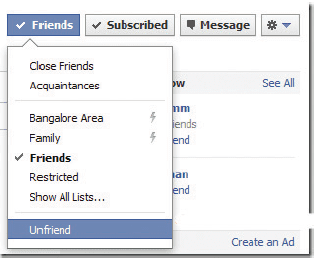While Bush Week may not provide quite as many opportunities for friend-making as its counterpoint, O-Week does, it does allow for the befriending of the few people you don’t know at your college, or the expansion of friendships into other colleges. It is also conveniently placed in the middle of the year when, let’s face it, a lot of the people you met in O-Week have now become mere acquaintances, or, in the worst case scenario, completely irrelevant to your life.O-Week was also when meeting these people was accompanied by fanatic legitimization of these newfound friendships through the medium of Facebook; Bush Week, however, is when I wonder, at what point is it okay to delete these people off of your friend’s list, as opposed to simply hiding their annoying posts from your News Feed?
During High School, a close friend of mine decided to delete a number of girls in our grade off of her Facebook friends list. Over the next two days she was confronted by several of these girls who demanded to know why she had deleted them. Of course, she lied and told them that her Facebook “messed up and was deleting people randomly” and that it was an accident. She then re-added them on Facebook. This was terrifying back then simply because it implied a level of pre-occupation with the Friends List that I hadn’t realised existed. It signalled an obsession with a number that supposedly represented relationships both frivolous and serious and indicated the popularity contest element to these numbers. More importantly, it suggested Facebook’s development into a platform for social diplomacy as well as a platform wherein relationships are free for the perusal and engagement of others – a public affair.
The addition of an individual to your friend’s list is made publically visible on Facebook with a small post on News Feeds as well as a post on the Friender and the Friendee’s walls respectively. This immediately announces to both parties’ Friends Lists that the Friender and Friendee apparently know eachother, but does not indicate whether they met for a brief period of time or had been best friends for several years. Assisted by the ability to determine mutual friends, third parties are able to become involved in this supposed friendship, no matter how frivolous or serious it may be. While undoubtedly this ability for third party involvement is a positive aspect of Facebook as it does enable more engagement with other friends and the enlargement and affirmation of one’s social sphere, it also results in the promulgation of any negative elements of the relationship.
I have a now ex-best friend listed as my sister on Facebook, despite the fact that I haven’t spoken to her in a year. If I choose to make my Friends List reflect reality, I will delete her and where her face used to sit on my profile will be a conspicuous white space ready to be questioned by either of our mutual friends. Facebook defines friendships as “Yes – because we are friends on Facebook” and “No – because you deleted me or didn’t accept my friend request”. It does not allow for a surreptitious removal of an individual from the List as ultimately friendships are represented by numbers. The removal of a friend from your Friend’s List has developed into a dramatic statement of un-acknowledging or a retraction of any relations of sort with that individual.
While of course an individual could simply attempt to filter whom they choose to accept as a friend on Facebook and accept only the closest of proven friends, I have to wonder what justification you will give to that one person you don’t know that well at work, or, even worse, an individual you have known for a long period of time who believes they are your close acquaintance. Facebook has gifted relationships with pseudo-affirmation. It is worth considering then, when you trawl through your newsfeed of Instagram and cat memes, how many of these people do you actually genuinely consider to be a friend? Why have you listed them as your friend, then? I’ll be the first to admit that many of my ‘friends’ are only there for the sake of attempting to be diplomatic. The prospect of the fall out when I try to explain to 300 people that I actually do not like, or care about them, is terrifying.
We acknowledge the Ngunnawal and Ngambri people, who are the Traditional Custodians of the land on which Woroni, Woroni Radio and Woroni TV are created, edited, published, printed and distributed. We pay our respects to Elders past and present. We acknowledge that the name Woroni was taken from the Wadi Wadi Nation without permission, and we are striving to do better for future reconciliation.
